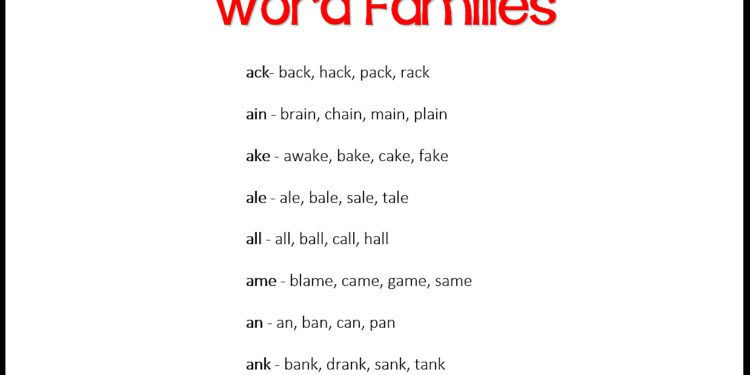Word families are groups of words that share a common pattern or part. Learning word families helps students recognize spelling patterns, build reading fluency, and expand their vocabulary. Below, you’ll find a variety of word families grouped by ending sounds, prefixes, and suffixes.
Short Vowel Word Families
Short vowel word families are some of the first that children learn when developing reading skills. They are based on consonant-vowel-consonant (CVC) patterns and make great building blocks for early literacy.
- -at: Words in this family include cat, bat, hat, sat, mat, rat, pat, and chat. These words all share the short “a” sound and a common “-at” ending.
- -an: This group includes man, can, pan, ran, tan, fan, and plan. The “-an” sound helps young readers connect similar words quickly.
- -ap: Examples are cap, map, nap, tap, gap, lap, and clap. These words are helpful for understanding the short “a” sound combined with the “-p” ending.
- -it: In this family are sit, bit, hit, lit, fit, kit, and pit. This group teaches the short “i” sound and is commonly found in early reading material.
- -in: Includes bin, fin, win, pin, sin, kin, and thin. These words are useful in phonics practice and help with recognizing the “-in” spelling pattern.
Long Vowel Word Families
Long vowel families typically include silent “e” or vowel teams that change the pronunciation of the vowel. These are often introduced after short vowel families.
- -ake: Words such as cake, bake, make, take, fake, shake, and rake help illustrate the long “a” sound created with a silent “e.”
- -ide: This family includes ride, side, tide, hide, wide, glide, and slide, all demonstrating the long “i” sound followed by a silent “e.”
- -ine: Examples include fine, mine, nine, pine, line, shine, and dine. These words also show the long “i” pattern with a silent “e.”
- -ore: In this group, you’ll find core, more, store, bore, score, shore, and before. They feature the long “o” sound and are common in upper elementary vocabulary.
- -ate: Words like late, date, fate, gate, mate, plate, and create show the long “a” sound formed with the “-ate” ending.
Blends and Digraph Word Families
These word families combine consonants to form unique sounds or blends. They’re helpful in developing spelling and pronunciation skills.
- -ing: Includes king, ring, sing, bring, thing, wing, and sting. The “-ing” ending is also used in verb forms, so it’s very versatile.
- -ash: Words such as bash, cash, dash, flash, rash, smash, and trash all share the “-ash” sound, which is helpful for learning digraphs like “sh.”
- -est: This family includes best, nest, rest, test, west, chest, and quest. The “-est” ending is also common in superlatives (fastest, biggest, etc.).
- -ick: Examples include kick, sick, brick, chick, click, pick, and trick. These words demonstrate consonant blends and the “-ck” spelling rule.
R-Controlled Word Families
R-controlled vowels are those where the letter “r” changes the way the vowel sounds. These can be tricky for learners, but grouping them helps build awareness.
- -ar: This group features car, bar, far, jar, scar, star, and tar. The “ar” makes a unique sound, as in “car.”
- -or: Words like for, core, more, shore, store, score, and before show how “or” modifies the vowel.
- -er: Examples include her, over, under, after, ever, clever, and river. The “-er” sound is common and often used in adjectives and nouns.
Word Families by Prefixes
Prefixes are added to the beginning of base words to change their meaning. Recognizing these families helps students decode unfamiliar words.
- Un- (not, opposite of): unhappy, unclear, unfair, unknown, unlock, unable. This common prefix indicates a negative or opposite meaning.
- Re- (again): redo, replay, rewrite, return, rebuild, regain. Often used to show repetition or doing something again.
- Dis- (not, opposite of): dislike, disagree, disappear, distrust, disown. Another negative prefix that suggests a reversal or opposite action.
- Pre- (before): preview, pretest, preschool, prepare, preheat. This prefix gives the idea of “before” in time or order.
- Mis- (wrongly): mislead, misplace, mistake, misuse, misread. Indicates that something was done incorrectly.
- Over- (too much): overeat, overuse, overwork, oversleep, overcharge. This prefix implies excess or something beyond normal.
Word Families by Suffixes
Suffixes are added to the end of words and can change a word’s meaning or function. They are useful for forming new words from base words.
- -er (one who): teacher, farmer, player, writer, singer, baker. These words describe people who perform actions.
- -ing (action): running, jumping, swimming, singing, painting. This is a common suffix for verbs in the present participle form.
- -ly (manner): quickly, slowly, happily, sadly, badly, easily. Used to turn adjectives into adverbs.
- -ness (state of being): kindness, sadness, darkness, happiness, fairness. This suffix turns adjectives into nouns.
- -tion (act or process): action, reaction, creation, vacation, completion. These words often relate to processes or results of actions.
Final Thoughts
Studying word families is one of the best ways to boost reading fluency, spelling, and vocabulary. Whether you’re a teacher, parent, or learner, using these families as a guide helps make language more predictable and easier to decode. Repetition and practice with these patterns make a huge difference in language development.
You may also like this: Best Student Areas in Bristol 2025












